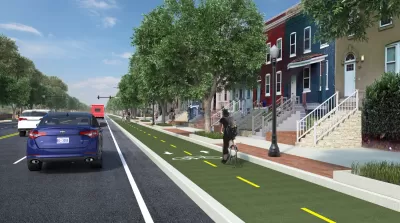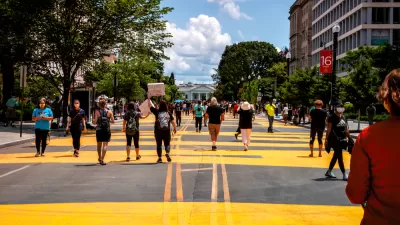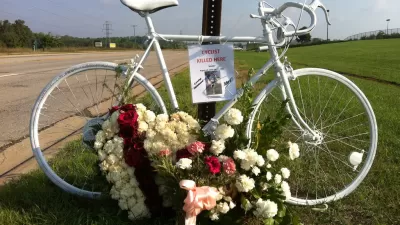Vision Zero is an ambitious goal, but it's impossible if traffic safety ideas aren't tested and implemented on the street.

Andrew Small reports from D.C., where the District Department of Transportation (DDOT) finally seems to be making progress on traffic safety programs after years of delays and frustration among Vision Zero boosters in the District.
Last year, the news three years into DDOT's Vision Zero was not good: "By that point in the year, 34 people overall had died on the city’s roads—D.C.’s worst year for traffic deaths in a decade," according to Small. Meanwhile projects were still several months away in the development pipeline and members of the District Council were getting frustrated with DDOT officials at a public hearing.
Fast forward to November 2019, and it's possible to report some progress. "In 2019, DDOT established a Vision Zero Office, fast-tracked quick-build safety projects like adding plastic pylons at crosswalks to slow drivers turns, and piloted some new ideas, such as dedicated bus lanes or painted curb extensions, that could be executed with little more than a can of paint," reports Small. The traffic safety statistics have also improved: "So far, 21 people have died from road crashes this year in the District, putting the city on track for the lowest number of traffic fatalities since the city committed to Vision Zero in 2015."
The article includes a lot more detail on the local political context for Vision Zero, the projects moving the needle for traffic safety, and the challenges for a true commitment to traffic safety, beyond the positive public relations benefit of announcing a Vision Zero campaign.
FULL STORY: Are D.C.'s Streets Finally Getting Safer?

Planetizen Federal Action Tracker
A weekly monitor of how Trump’s orders and actions are impacting planners and planning in America.

San Francisco's School District Spent $105M To Build Affordable Housing for Teachers — And That's Just the Beginning
SFUSD joins a growing list of school districts using their land holdings to address housing affordability challenges faced by their own employees.

The Tiny, Adorable $7,000 Car Turning Japan Onto EVs
The single seat Mibot charges from a regular plug as quickly as an iPad, and is about half the price of an average EV.

Trump Approves Futuristic Automated Texas-Mexico Cargo Corridor
The project could remove tens of thousands of commercial trucks from roadways.

Austin's First Single Stair Apartment Building is Officially Underway
Eliminating the requirement for two staircases in multi-story residential buildings lets developers use smaller lots and more flexible designs to create denser housing.

Atlanta Bus System Redesign Will Nearly Triple Access
MARTA's Next Gen Bus Network will retool over 100 bus routes, expand frequent service.
Urban Design for Planners 1: Software Tools
This six-course series explores essential urban design concepts using open source software and equips planners with the tools they need to participate fully in the urban design process.
Planning for Universal Design
Learn the tools for implementing Universal Design in planning regulations.
Smith Gee Studio
City of Charlotte
City of Camden Redevelopment Agency
City of Astoria
Transportation Research & Education Center (TREC) at Portland State University
City of Camden Redevelopment Agency
Municipality of Princeton (NJ)





























